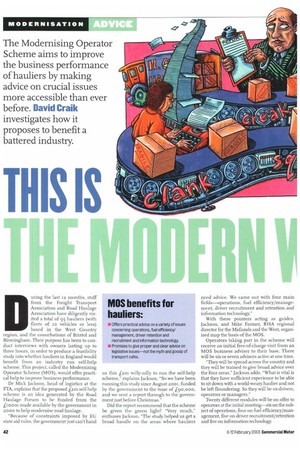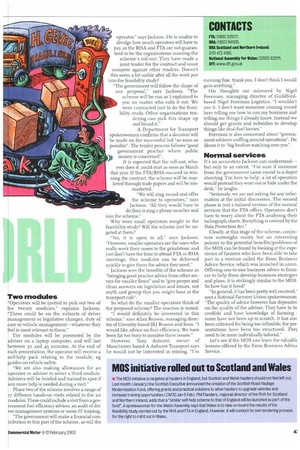THIS IS
Page 42

Page 43

If you've noticed an error in this article please click here to report it so we can fix it.
The Modernising Operator Scheme aims to improve the business performance of hauliers by making advice on crucial issues more accessible than ever before. David Craik investigates how it proposes to benefit a battered industry.
uring the last 12 months, staff from the Freight Transport Association and Road Haulage Association have diligently visited a total of 95 hauliers (with fleets of io vehicles or less) based in the West Country region, and the conurbations of Bristol and Birmingham. Their purpose has been to conduct interviews with owners lasting up to three hours, in order to produce a feasibility study into whether hauliers in England would benefit from an industry run self-help scheme. This project, called the Modernising Operator Scheme (MOS), would offer practical help to improve business performance.
Dr Mick Jackson, head of logistics at the VITA, explains that the proposed fm self-help scheme is an idea generated by the Road Haulage Forum to be funded from the oom made available by the government in 200h0 to help modernise road haulage.
"Because of constraints imposed by EU state aid rules, the government just can't hand us this f2n1 willy-nilly to run the self-help scheme," explains Jackson. "So we have been running this study since August 2001, funded by the government to the tune of f9o,00ci, and we sent a report through to the government just before Christmas."
Did the report recommend that the scheme be given the green light? "Very much," enthuses Jackson. "The study helped us get a broad handle on the areas where hauliers need advice. We came out with four main fields—operations, fuel efficiency/management, driver recruitment and retention and information technology."
With these pointers acting as guides, Jackson, and Mike Farmer, RHA regional director for the Midlands and the West, organised map the basis of the MOS.
Operators taking part in the scheme will receive an initial free-of-charge visit from an MOS business adviser to their base. There will be six or seven advisers active at one time.
"They will be spread across the country and they will be trained to give broad advice over the four areas," Jackson adds. "What is vital is that they have sufficient experience to be able to sit down with a world-weary haulier and not be left floundering. So they will be ex-drivers, operators or managers."
Twenty different modules will be on offer to operators at the initial meeting—six on the subject of operations, four on Fuel efficiency/management, five on driver recruitment/retention and five on information technology.
Two modules
"Operators will be invited to pick out two of the twenty modules," explains Jackson. "These could be on the subjects of driver management or legislative changes, duty of care or vehicle management—whatever they feel is most relevant to them."
The modules will be presented by the adviser on a laptop computer. and will last between 30 and 45 minutes. At the end of each presentation, the operator will receive a self-help pack relating to the module, eg guides on vehicle safety We are also making allowances for an operator or adviser to select a third module. Advisers will be briefed and trained to spot if any more help is needed during a visit."
Phase two of the scheme involves a range of 77 different hands-on visits related to the 20 modules. These could include a visit from a government fuel efficiency adviser, an audit of driver management systems or some IT training.
"The government will make a financial contribution to this part of the scheme, as will the operator," says Jackson. He is unable to divulge how much operators will have to pay, as the RHA and FTA are not guaranteed to be the organisations running the scheme's roll-out. They have made a joint tender for the contract and must compete against other tenders. Doesn't this seem a bit unfair after all the work put into the feasibility study?
"The government will follow the shape of our proposal," says Jackson. "The scheme will be run as I explained to you no matter who rolls it out. We were contracted just to do the feasibility study. Other organisations tendering can pick this shape up and brand it."
A Department for Transport spokeswoman confirms that a decision will be made on the successful bid "as soon as possible". The tender process follows "good government practice where public )) money is concerned". It is expected that the roll-out, whoever does it, could start as soon as March this year. If the FTA/RHA succeed in winning the contract, the scheme will be marketed through trade papers and will be telemarketed.
"We will ring round and offer the scheme to operators," says Jackson. "All they would have to do then is ring a phone number and join the scheme."
Why were small operators sought in the feasibility study? Will the scheme just be targeted at them?
"No, it is open to all," says Jackson. "However, smaller operators are the ones who really work their noses to the grindstone and just don't have the time to attend FTA or RHA meetings. Our modules can be delivered quickly to give them the advice they need."
Jackson sees the benefits of the scheme as "bringing good practice advice from other sectors for smaller firms" and to "give proper and clean answers on legislation and issues, not myth and gossip that you might hear at the transport cafe".
So what do the smaller operators think of the proposed scheme? The reaction is mixed, "I would definitely be interested in this scheme," says Allan Reason, managing director of Coventry-based J&J Reason and Sons. 'I would like advice on fuel efficiency We have been far too busy to monitor these issues."
However, Tony Ashurst, owner of Manchester based A Ashurst Transport says he would not be interested in joining. "Pm running fine, thank you. I don't think I would gain anything."
His thoughts are mirrored by Nigel Foreman, managing director of Guildfordbased Nigel Foreman Logistics. "I wouldn't use it. I don't want someone coming round here telling me how to run my business and telling me things I already know. Instead we should get grants and subsidies to develop things like dual-fuel lorries.
Foreman is also concerned about "government advisers sniffing around operations". He likens it to "big brother watching over you".
Normal services
It's an accusation Jackson can understand but only to an extent. "I'm sure if someone from the government came round to a depot shouting 'I'm here to help', a lot of operators would pretend they were out or hide under the desk," he laughs.
"Seriously, we are not asking for any information at the initial discussion. The second phase is just a tailored version of the normal services that the FTA offers. Operators don't have to worry about the FTA analysing their tachograph charts. Everything is covered by the Data Protection Act."
Clearly, at this stage of the scheme, conjecture outweighs reality but an interesting pointer to the potential benefits/problems of the MOS can be found by looking at the experience of farmers who have been able to take part in a venture called the Farm Business Advice Service, which was launched in 2000. Offering one-to-one business advice to farmers to help them develop business strategies and plans, it is strikingly similar to the MOS. So how has it fared?
"In general, it has been pretty well received,' says a National Farmers Union spokeswoman. "The quality of advice however has dependeC on the quality of the adviser. They have to Ix credible and have knowledge of farming . some have not been up to scratch, It has alsc been criticised for being too inflexible; the pre. sentations have been too structured. The) need to be more individually tailored."
Let's see if the MOS can learn the valuabl lessons offered by the Farm Business Advice Service.




























































































































































